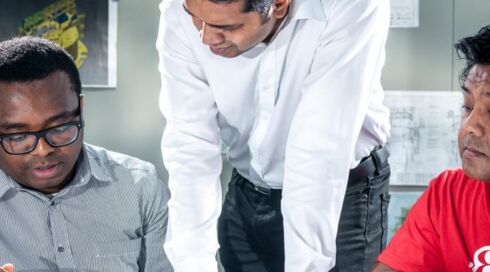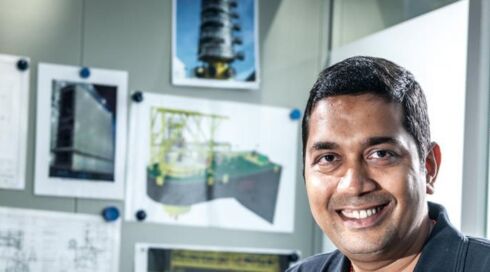3
“Everyday can be a challenge, it’s not great when you have to get up at 5.30am and try to be in the office before 7.30am.” Not everyone is a morning person, especially when your daily activities concern providing technical response and guidance to offshore operational queries, de-bottlenecking and optimization of process facilities in the offshore industry. Nnamdi Iwuagwu is just one of our many professionals in Discipline Engineering and Project Controls who makes this job look easy.
Reaching for the Best in Everything
After receiving his Bachelor Degree in Polymer (Petrochemical) Engineering, Nnamdi decided to continue his education, by studying for a Masters degree at the Imperial College London. “I was at Imperial from 2007-2008, before that time I wanted to pursue the best options for my career, so I decided to go to a world class university. Studying at the Imperial College changed my life, because not only was the quality of education at a high standard but also the college had strong links with different industries.”
Six years later, Nnamdi is working as a Senior Process engineer for one of Holland’s prestigious offshore Floating Production, Storage and Offloading (FPSO) systems construction companies. “In my current project I’m working on the conversion of a Topside Boiler to fire on stabilised crude oil instead of diesel. My role in this is to prepare all of the process deliverables, perform pressure drop and line sizing calculations and participate in all areas of the hazard and operability study.”
Experienced in Simulations
Nnamdi explains that as a process engineer you need to have solid hands-on-experience in certain steady state and dynamic simulation software like HYSYS and UNISIM to modify and optimize different process systems. “If you want to become a process engineer you need to be experienced in HYSYS, UNISIM and PIPESIM,” explains Nnamdi, “PIPESIM is a steady state multiphase simulator used in the design and diagnostic analysis of oil and gas production systems that allows you to overcome the challenges of flow assurance in pipeline systems. I would also suggest using the software OLGA as well, as this is used for both steady state and dynamics.”
Breaking regulations and Facing the Challenge
“The most challenging aspect of my job is designing processes that will work in this unpredictable offshore environment. Usually we will apply all process engineering standards to make a good design, however; sometimes we have to make decisions that are outside of these standards so that these processes can work effectively offshore. It’s quite interesting to see these processes resolved, as you experience things that you never thought you would experience in the offshore environment.
One of the challenges on my current project is the protection of the crude oil piping from sun exposure, which runs from the crude oil tank to the boiler part. It’s quite a long pipe and this can be exposed to hot and cold temperatures, so we have to make sure that we prevent the pipes from stress cracking. Diesel is also very expensive so replacing the diesel fuel with stabilised crude will be a good return on investment."
Perseverance with Every Project
Nnamdi has worked on a variety of projects over the last six years, he discusses what his aspirations are for the future, “As I’m currently working in the Floating Production Operation Support department, I would like to lead one of these topside modification projects someday. I like to provide my input and design/operational ideas to the model and bring these factors together in developing and managing the project effectively. To lead a team you have to have strong technical skills in addition with strong interpersonal skills. Developing good communication within your team is a very important factor in this industry; everyone has a different level of understanding so you have to learn how to communicate differently with each person. Always be a team player and have fun with your work each day.”
Over the last six years, Nnamdi continues to grow within his field, “A trainee should never forget what they have learnt from their education. They also have to read a lot of information about the job they are working on. Also it’s very important that they research into the company that they will be working for and ask questions to their senior colleagues as the offshore industry takes some time to get used to.”
.png)
.png)

